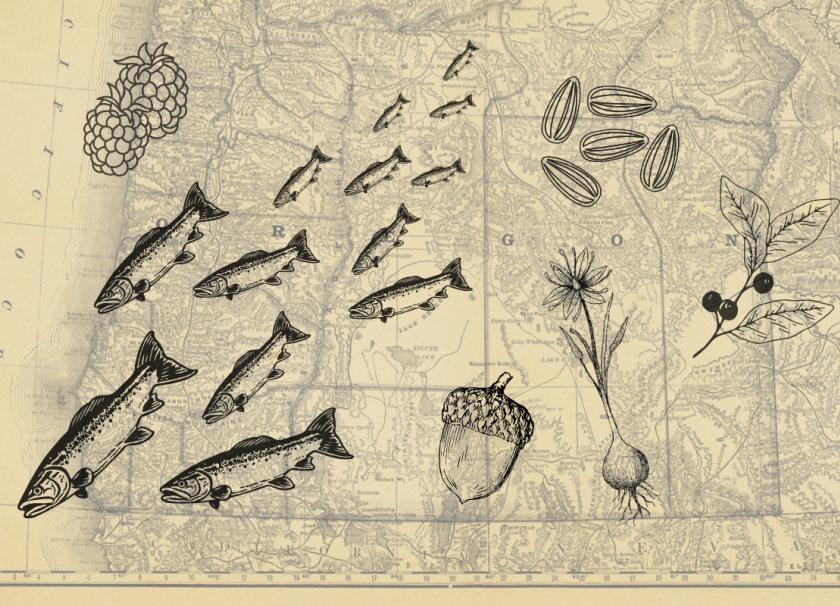
Celebrating Indigenous Food and Traditions
Each October, when so many across the country celebrate Indigenous Peoples' Day, the Ashland Food Co-op pauses to reflect on the land we call home, the people who've cared for it, and how food and connections to the land can help us return that inheritance in a positive way. This holiday isn’t just a request that we correct the record of history, but that we also plant a greater sense of home, appreciation, and responsibility. In southern Oregon, that means exploring the histories and teachings of the Shasta, Takelma, Latgawa, and other tribes whose ancestral lands include what is now Ashland.
Indigenous peoples in our region lived prior to Euro-American settlement in a deep relationship with food cycles and place. In the Rogue Valley and along the Table Rocks, the Takelma were sometimes called “Dagelma,” meaning “those who dwell by the river.” Life revolved around the waters and the changing seasons. Salmon filled their nets, while wild roots, berries, seeds, and game rounded out their meals. As the seasons changed, they followed the rhythms of the land, moving between elevations to fish, gather, hunt, and carefully store what they would need for the months ahead. Their activity wasn’t just for survival, but for reciprocity: farming soils, burning to maintain open meadows, incubating plant habitats, and honoring areas of ceremony. Their ways of tending the land remind us that we still have much to learn about balance, respect, and stewardship.
Deep disruption came in the mid-1800s: the Rogue River Wars of 1855–1856, when numerous Indigenous communities were forcibly relocated, treaties were violated, and war and disease devastated populations; the brief existence of the Table Rock Reservation was formed and abolished; and numerous descendants of these groups found themselves caught up in confederated treaties or relocated to other reservations. In spite of this break, Indigenous families still reside here, remember, revive language, and preserve cultural food traditions throughout Oregon today.
Food is one of the most powerful connections we have to memory, respect, and the planet itself. Here in Oregon, "first foods" like salmon, roots, berries, and game are still central to Indigenous food sovereignty.This work in southern Oregon centers on renewal: restoring native plants, rebuilding traditional harvesting, and restoring both cultural connections and care for the earth. By the fact that co-ops are community, we can be the change by learning about Indigenous foodways, finding Indigenous-grown produce when possible, and supporting organizations that uplift Native voices.
Indigenous Peoples’ Day reminds us that honoring the past is not only about memory, but also about the actions we take today. We encourage you and our community to become conscious of whose territory you stand on, to contribute financially to Native nonprofits, and to buy at Indigenous food producers. There's something good we can do towards reciprocity, justice, and healthier relations with people and places.
Sources:
- OSF Ashland Land Acknowledgment: https://www.osfashland.org/land-acknowledgment
- BLM Table Rocks History: https://www.blm.gov/programs/recreation/recreation-activities/oregon-washington/tablerocks/cultural-history/regional-tribes
- Rogue River Wars: https://en.wikipedia.org/wiki/Rogue_River_Wars
- Table Rock Reservation: https://en.wikipedia.org/wiki/Table_Rock_Indian_Reservation
- Travel Oregon – Indigenous Foods: https://traveloregon.com/things-to-do/culture-history/celebrate-oregons-indigenous-foods/
- My Oregon – Indigenous Foodways in Southern Oregon: https://www.myoregon.gov/2022/12/20/how-indigenous-communities-are-reclaiming-knowledge-and-relationships-to-first-foods-in-southern-oregon/
More Co-op News
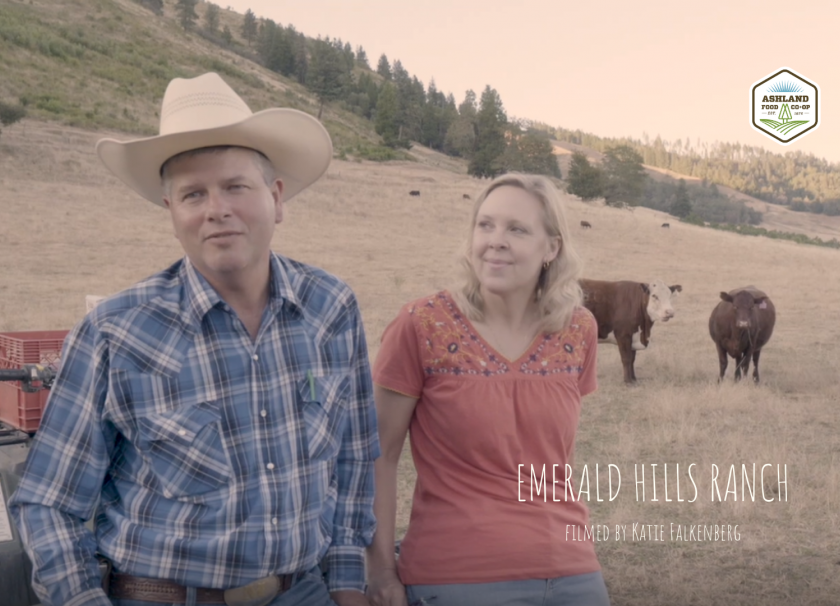
A Visit with Emerald Hills
Visit the Emerald Hills Ranch and learn more about this fourth generation ranching family that the Ashland Food Co-op is so proud to partner with for more than twenty years.
A Conversation with Katie Falkenberg, Photographer and Filmmaker
Katie Falkenberg's photography and filmmaking has taken her all over the world, and lucky for us - she's been calling the Rogue Valley home for a couple years now. Exquisitely and harmoniously capturing the world around her, she is documenting not only through the lens but also through her peaceful and loving spirit. Katie reached out to us in hopes of collaborating after falling in love with the co-op soon after moving here.

March Change for Good Recipient: North Mountain Park Nature Center
March's Change for Good Recipient is
North Mountain Park Nature Center,
a division of Ashland Parks and Recreation, that encompasses demonstration gardens, a nature playground, and approximately 14 acres of Natural Area that is managed for wildlife preservation and public education.

February Change for Good Recipient: Ashland High Arts Advocates
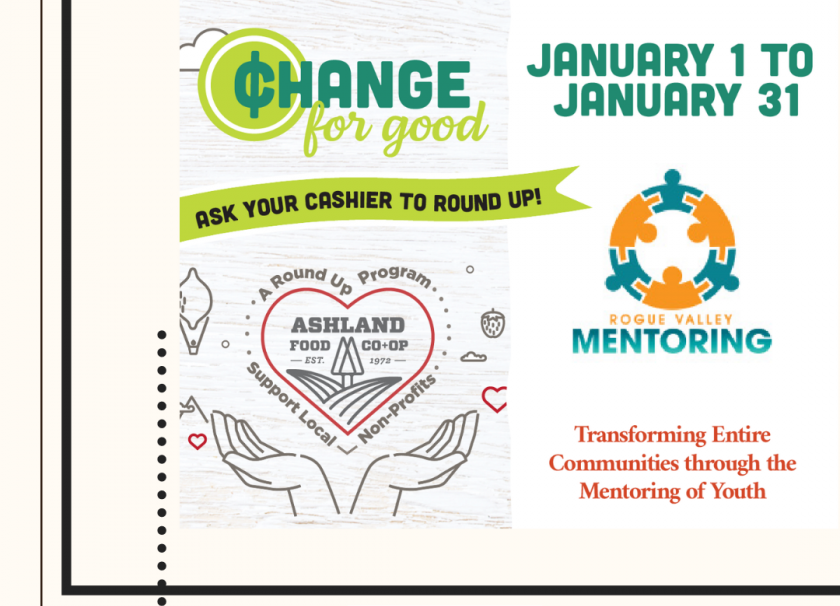
January Change for Good Recipient: Rogue Valley Mentoring
Since 2005, Rogue Valley Mentoring (formerly the Rose Circle Mentoring Network) has trained over 500 adults who have mentored over 2,000 youth in our valley; letting young people know that they are not alone. A caring and compassionate ear shows them that they matter, and they they are experts of their own experience.
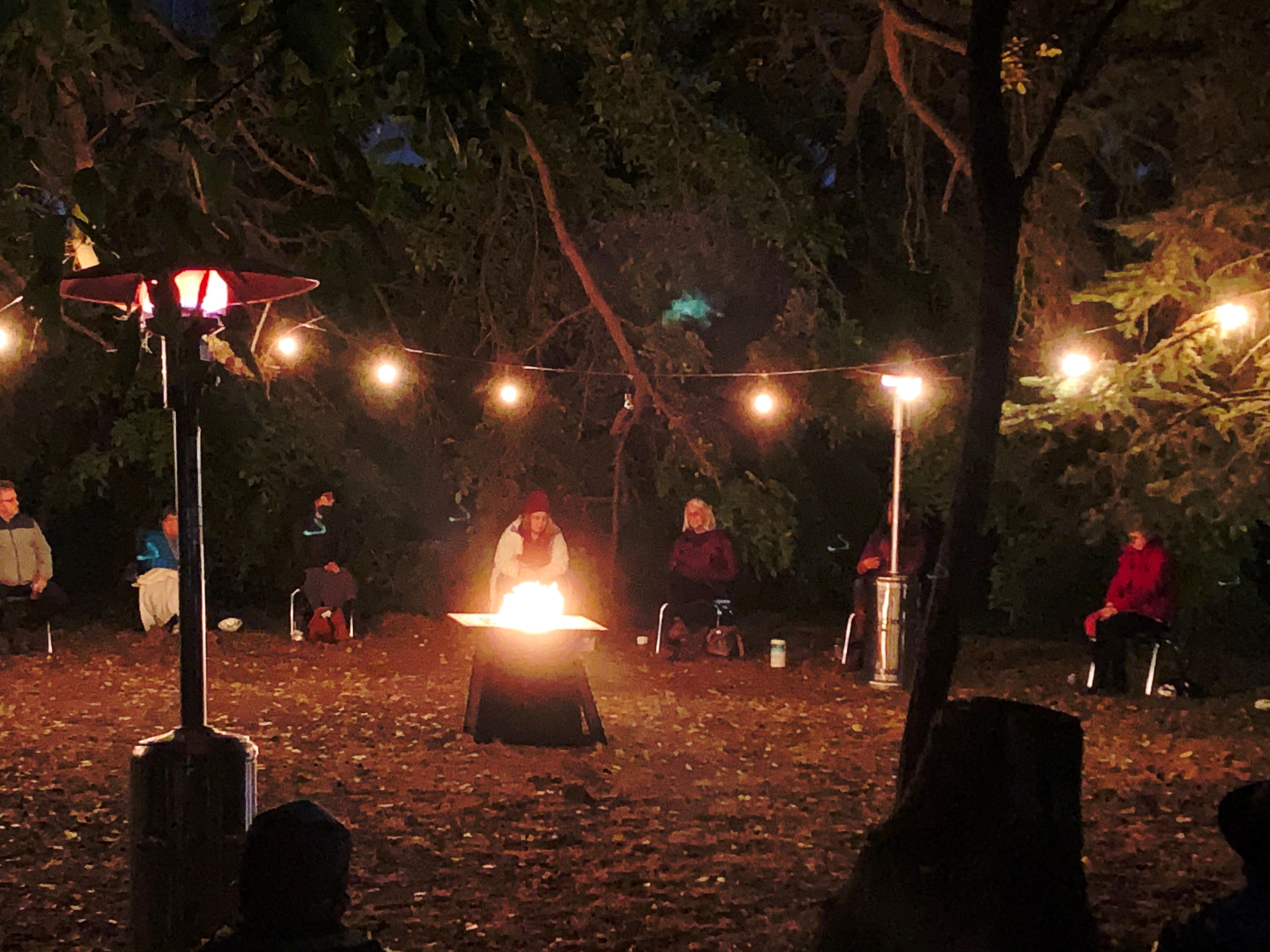
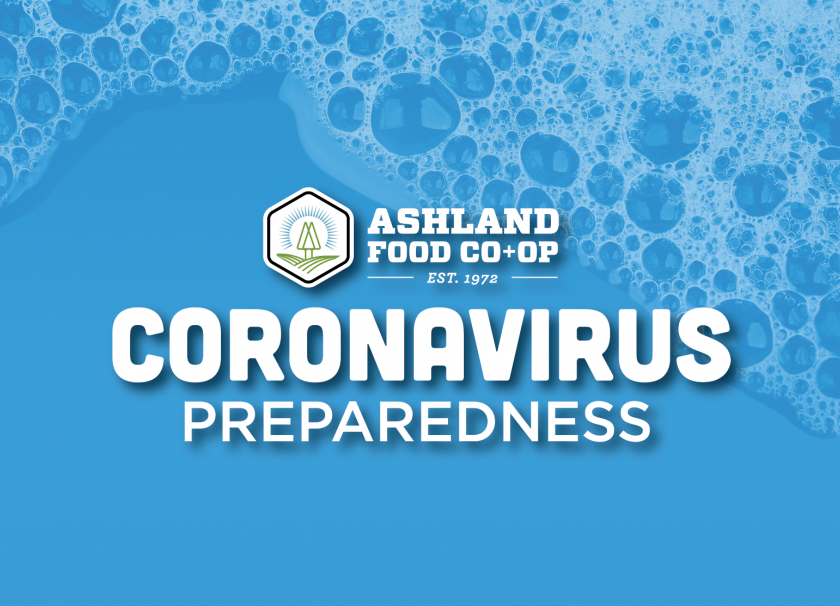
Coronavirus Preparedness at the Co-op
Update as of March 15th, 2022: Oregon Health Authority no longer requires face coverings to be worn in all public indoor settings.

Shopping Safely & Efficiently
As coronavirus cases increase in Jackson County, the Co-op is taking extra precautions to protect shoppers and employees.
To ensure social distancing in the store, the number of persons allowed in the store at once has been reduced to 50% capacity. Understandably, this may lead to a short wait outside of the store, but please be assured the line moves quickly.
In order to keep the wait as short as possible, here are a few steps you can take to help out:

10 Ways to Shine Your Light in Dark Times
By Allan Weisbard L.C.S.W.
Since 1963, autumn has been a difficult time for me. Two months shy of my 13th birthday I lost my younger brother to cancer, then shortly afterwards, President Kennedy was assassinated.

Masks Required for All In-Store Shoppers

To protect the health of Co-op staff and shoppers, all shoppers and other visitors on Ashland Food Co-op property must wear face coverings over mouth and nose except when dining in an approved area. As of November 11, 2020, face shields will not be permitted unless worn with a mask.
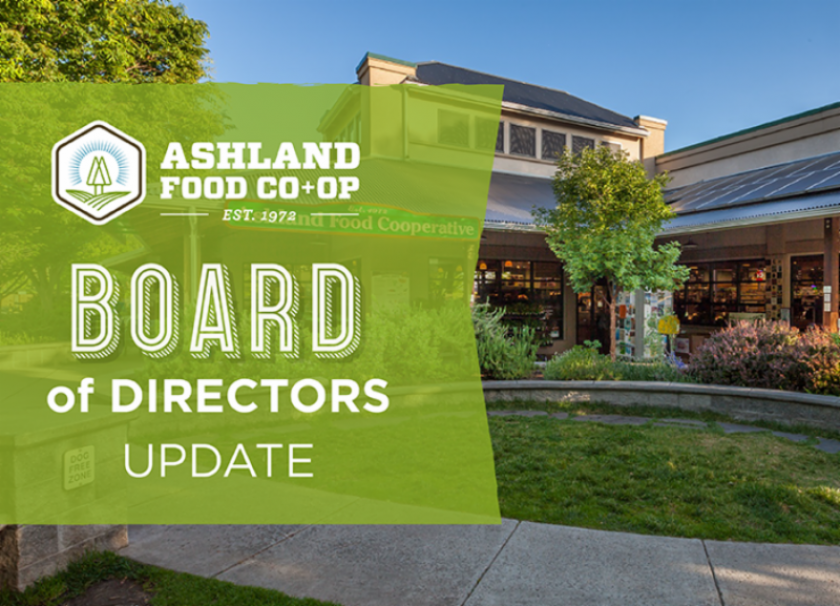
From the Board: Co-ops Look in the Mirror
By Annie Hoy, Board Secretary and Chair of Owner Engagement Committee
Food Co-ops around the nation proudly display signage saying EVERYONE WELCOME. Or they use the slogan, “Anyone can shop. Anyone can join.” But are food co-ops, and other cooperative businesses, walking the walk?

November/December GM Update: Overcoming Challenges
It’s probably already cliche to say “it’s been one heck of a year.” There have been challenges a-plenty for all of us, whether we’re working or shopping at the Co-op - but I’m so proud of how all of us have persevered.

End of year wrap-up on Strategic Energy Management at the Co-op
Hi there. I hope this finds you well. It’s me, Nina Friedman, Strategic Energy Management (SEM) intern for the Ashland Food Co-op. The global and local crises have only devolved into further chaos since we last spoke. As we sit with the reality of coworkers, neighbors, and friends who’ve lost their homes and businesses to the recent fires, and thousands more across the nation losing their loved ones to COVID-19, I imagine many are feeling frozen and powerless to help those that are suffering.
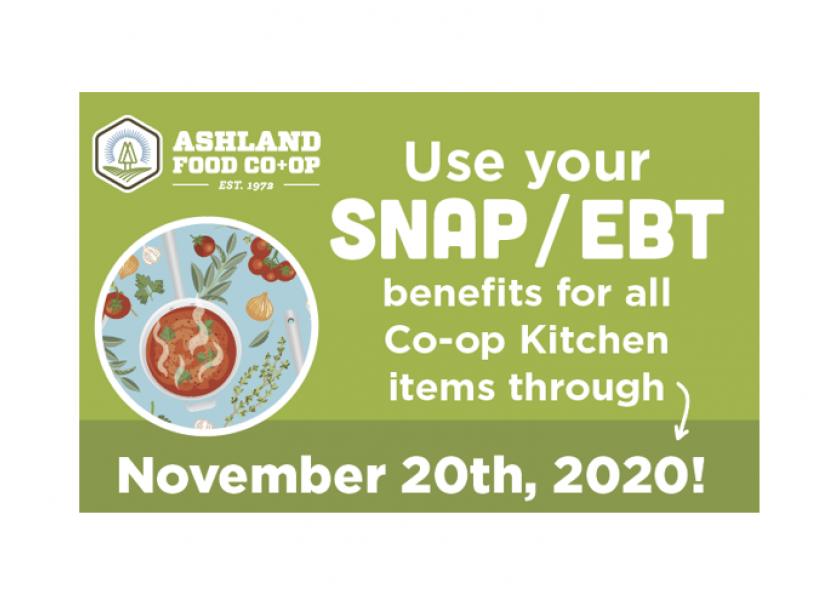
SNAP in the Co-op Kitchen and Thanksgiving
Use your SNAP EBT benefits for all Co-op Kitchen items through November 20th, 2020!
Recognizing the difficulties in food preparation for families who lost their homes in the local wildfires, the State of Oregon has expanded SNAP benefits to be used for hot foods, like made-to-order and hot bar meals from the Co-op Kitchen, through November 20.
And starting on November 16, you can get an early taste of Thanksgiving as the Co-op Kitchen hot bar rolls out the full Thanksgiving spread.

Black Lives Matter
We acknowledge that the Ashland Food Co-op has not had a culture where all employees and community members felt safe sharing their experiences of discrimination in our store. We apologize for this. We are on a learning journey. We have reached out for help, and are listening to our Black, Indigenous and People of Color (BIPOC) employees and owners who want to be part of the positive change we seek.
* * * * *
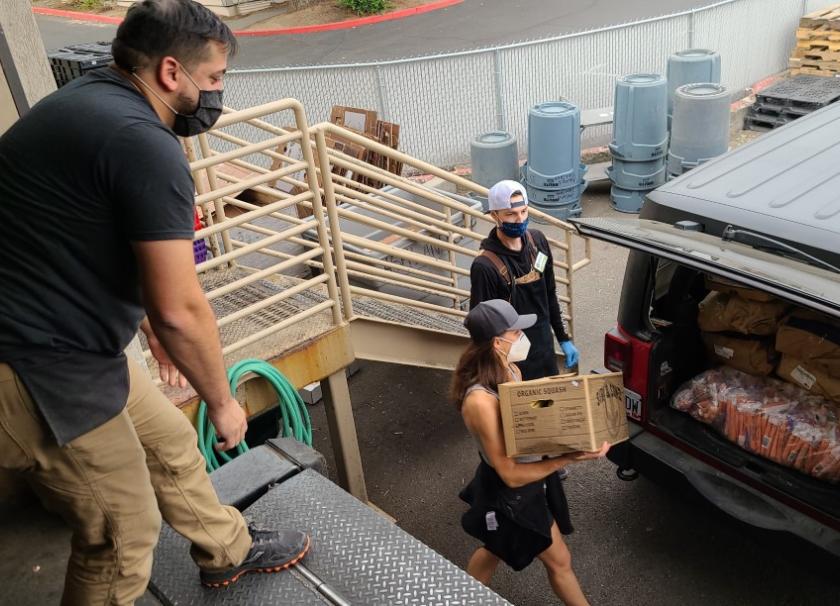
Vendors & businesses donating to relief efforts
From day one of the Almeda Fires, the Co-op team wanted to help the community. They reached out to vendors across the region and country to ask for their help with products, supplies and food to get to the fire victims.
And that help came through in big ways, getting nutritious food to displaced families, home supplies in high demand, and wellness and food for first responders and firefighters. Thank you for supporting these businesses as thanks for their help in our community's relief efforts.
